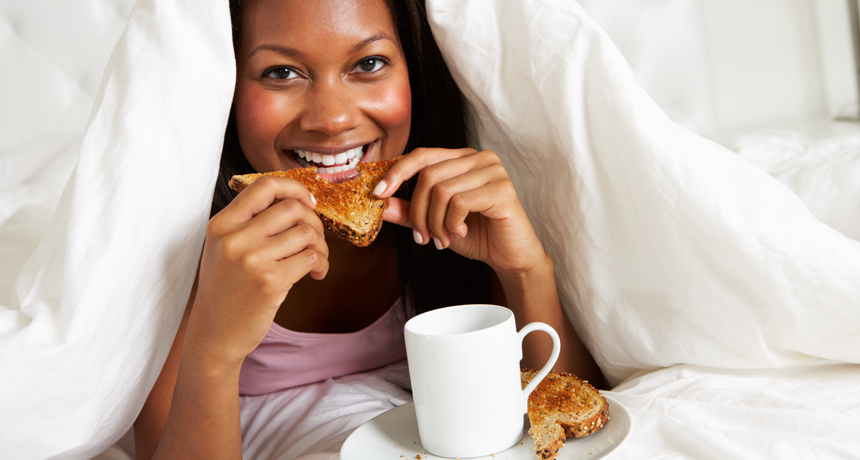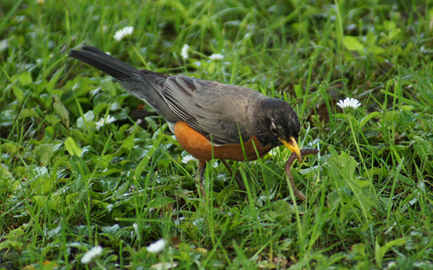Early birds eat better
Night owls eat later in the day and more poorly, study finds

People who enjoy mornings also tend to make healthier food choices throughout the day, new research finds.
monkeybusinessimages/iStockPhoto
If you’re a morning person, you’re in luck. Early birds — people who feel most energized in the morning — tend to make healthier food choices throughout the day than night owls. That’s the take-home message from a new study. People who really come to life in the evening hours also tend to eat later and munch more junk food.
On weekends, when most night owls don’t have to get up for work or school, their eating habits get even worse. On Saturday and Sunday, “evening types had more irregular meal times and twice as many eating occasions,” notes study author Mirkka Maukonen. She studies human nutrition and obesity at the National Institute for Health and Welfare in Helsinki, Finland.
Her study looked at data from two surveys in 2007 conducted with adults living in Finland. The first had focused on people’s risk of heart disease. It also had included questions that help separate early birds from night owls. For example, it asked: “During the first half-hour after having woken in the morning, how tired do you feel?” Night owls would most likely select “very tired” or “fairly tired” from the multiple-choice options. Early birds would probably pick “fairly refreshed” or “very refreshed.”
The second survey assessed eating habits. Participants described when and what they had eaten during the past two days. This is referred to as dietary recall.
Maukonen’s team then looked at 1,854 people who had completed both the dietary recall and questions pointing to their night-owl or early-bird lifestyle.
After analyzing the data, the researchers found that both morning and evening people consumed approximately the same number of calories over the course of a whole day. However, night owls tended to eat their meals later than early birds did. The researchers also looked at what the participants had been eating. All foods that provide calories contain some combination of protein, fat and carbohydrates (Kar-boh-HY-drayts). Sugar and starch are both types of carbohydrates.

Protein is found in meat, eggs, fish and nuts. It tends to help a person feel full and stay healthy. Sugar tastes delicious and provides a quick burst of energy. Fat also tastes great but delivers its energy over a longer period. But foods high in sugar and fat, such as donuts, pizza and other junk foods, are unhealthy. Consuming lots of these foods increases a person’s risk of developing obesity, heart disease and other illnesses.
Before 10:00 a.m., night owls consumed less food than did early birds. And more of their calories came from sugar. After 8:00 p.m., the night owls ate more sugar and more fat as well. Meanwhile, early birds ate more protein during both the morning and the evening hours.
The researchers reported their findings in the March issue of Obesity.
“It’s really important that we start understanding differences between people who eat late at night and early in the morning,” says Courtney Peterson. She was not involved in the study. She studies diet and meal timing at the University of Alabama at Birmingham.
Night owls tend to be less healthy overall than are early risers, Peterson notes. They are more likely to fall ill with heart disease, diabetes or cancer. Many studies have looked into this issue. The fact that night owls tend to eat more junk food probably plays a role, Peterson says. And waiting until later in the day to eat may also be problematic. Maukonen’s next study will look at whether the timing of a person’s meals can lead to weight gain or obesity.
Other factors also can mess with a night owl’s health. “Night owls in general sleep worse,” says Peterson. A lack of sleep also might explain their greater risk of disease. Plus, poor sleep has been linked to unhealthy food choices.
The current study is one of correlation, not causation, point out both Peterson and Maukonen. In other words, night owls tend to have poor eating habits. But that doesn’t necessarily mean that being a night owl makes a person a poor eater. It could be the reverse — eating poorly could affect people’s sleep habits.
The new findings should serve as a wake-up call to night owls. For them, the new results should “encourage paying attention to healthier lifestyle choices,” says Maukonen. Night owls can still live it up during the evening hours. But they should try to get enough sleep. And no matter when people wake up, they should eat healthy foods throughout the day. Many studies have shown that eating a good breakfast helps reduce the risk of disease.
And what’s the takeaway for early birds? Keep on getting the worm!







